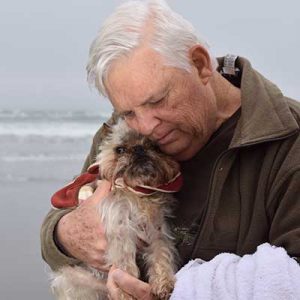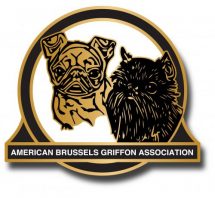
The Brussels Griffon is a long-lived breed by dog standards, often living to be 15 or older. As the Griffon ages, dilemmas in nutrition, management, and care occur more often. These are just some of the considerations.
Added weight is the absolute enemy of any dog, but it can be devastating to the health of an older Griff. An older dog is prone to weight gain for several reasons, one of which is reduced activity. By age 7 or 8 Griffy has decided he is most suited to the role of couch potato. A concerted effort must be made to keep him moving – a daily walk is ideal – to prevent weight gain. Once a dog has become obese bones and joints are stressed by carrying around the additional weight, impacting agility and speed, and further reducing movement. Another factor in weight gain is the human tendency to pamper the aging pet with treats they enjoy. Ice cream, steak, pizza, or a trip to McDonald’s may be Griffy’s favorites, but should definitely be fed with moderation – a LOT of moderation.
The condition of the teeth may also play a part in how the dog’s diet is managed. The Griffon mouth is unique in all of dogdom. One never knows what one will find, or not find, upon opening it. Teeth that were there yesterday may not be there today. Even in the face of good dental hygiene, the older dog may be missing teeth due to hard play or chewing. This is no excuse for feeding 31 Flavors. It may, however, be necessary to soak Griffy’s kibble for him. Research by the dog food industry has resulted in several products developed to meet the needs of the aging/obese animal. Avoid the urge to switch to a semi-moist or canned food, which are not as nutritionally dense as premium kibble.
As with people, arthritis plagues the older dog – another reason to keep weight under control. Griffy may no longer be able to make it onto the bed by himself. Care should be taken to help him up, but also to help him down. Jumping from furniture will further stress the joints. Most of the new human arthritis medications have veterinary counterparts. When mobility begins to be impaired, a trip to the vet for evaluation and possible medication is in order.
Sensory faculties diminish with age. Griffy may not be able to see or hear as well as he once did. The Brussels Griffon is such an intuitive breed, and so in touch with their person, that loss of sight or hearing may be quite advanced before it is noticed. As long as routines remain the same and no one moves the furniture the Griffon may be negotiating so well the owner is unaware that he is impaired. If Griffy cannot hear you call, or see where you’ve gone, he is in peril. It is essential to be mindful of the state of his senses for his own protection, but in most cases it is a fact of nature and cannot be cured. Some hand signs can be developed to direct the deaf dog. Many blind dogs do quite well for many years, especially if the loss of sight has been gradual.
A few additional cautions for the aging Griff: spay the older bitch before pyometra rears its ugly head. Keep nails close so footing is sound. Trim hair around the eyes to prevent irritation as eyes tend to become dry. Exam regularly for lumps, bumps and skin lesions. Temperature regulation is even more crucial: limit activity in hot weather and keep feet out of ice and snow.
Owning a Brussels Griffon can be means long years of love and devotion. A bit of preventive medicine can keep Griffy healthy and contented well into his senior years.
Anne K. Catterson
Published in the December, 2002 issue of the AKC Gazette
